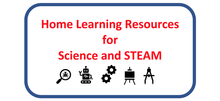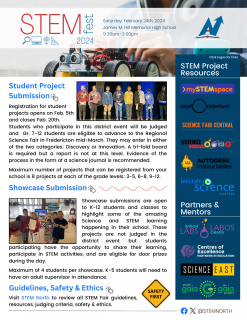Posted: September 17, 2020
Science
Posted: September 15, 2020

Posted: May 4, 2020

Youth Science Canada Online STEM Fair submissions are open!
See: Online STEM Fair Guide 2020 and keep an eye on YSC Facebook for more details!
Register HERE
Posted: April 27, 2020

As you are aware, our District had to make the hard decision to cancel our District STEM Fest events in Bathurst and Miramichi in March 2020.
We understand how hard our students and teachers worked to be prepared and were disappointed with the lost opportunity to showcase these amazing projects. We encouraged and hoped that students would keep their project ongoing for future learning and showcasing.
An opportunity has arisen for grade 7-12 students if they wish to showcase their project virtually at a national level. Youth Science Canada has announced a virtual fair for May 2020. They understand that many regional fairs were cancelled so this opportunity is open to any interested student from grades 7-12 (whether they were attending district/regional fairs or not).
** Update:
- Monday, May 4 - Open for project & STEM Expo entry
- Tuesday, May 19 - Open for public, home learning & judging
- Thursday, May 21 - Region judging deadline
- Wednesday, May 27 - YSC & Sponsor judging deadline
- Friday, May 29 - Ribbons awarded & announced
Posted: April 5, 2020

Science and STEAM Home Learning Supplementary Resources
The primary focus when facilitating Science and STEAM Home Learning should be on promoting and instilling a love for Science, STEAM and a general curiosity and wonder about ourselves and the world around us (and beyond!). When we can facilitate the acquisition of Science skills for students, we are empowering them to continue their learning on their own.
The resources suggested are a small sample of what is at our fingertips so we have attempted to shortlist this for teachers. If you have a great site or strategy you use, or have come across, please feel free to share it with a member of our team!
Keep in mind, as well, the multitude of opportunities there are for interdisciplinary learning. When a student keeps a scientific journal, they are also often meeting outcomes in literacy and numeracy. When learning about and discussing Climate Change, there are Social Studies outcomes being met. When designing or prototyping there are many technology outcomes being met. When students are exposed to interdisciplinary learning, their learning becomes more streamlined, relevant and personalized.
As always, the primary resource for Science is our provincial curriculum documents: NB Curriculum (Anglophone Sector)
The new Grades 3, 4, 5 Science curricula have been released. You are welcome to use it as a resource now however it is not mandatory at this time:
Science 3: Our Local Environment
Science 4: Properties and Uses of Earth Materials
Science 5: Living and Technological Systems
Smarter Science can also be used as a primary resource.
Smarter Science is a framework for teaching and learning science in grades 1–12 and for developing the skills of inquiry, creativity, and innovation in a meaningful and engaging manner.
Supplementary Science Resources for Home Learning by Grade Level (these resources will be updated on an on-going basis):
Supplementary French Science Resources for Home Learning by Grade Level (these resources will be updated on an on-going basis)
We will be posting ASD-N Weekly STEAM with the goal of promoting and instilling a love for Science, STEAM and general wonder about the world around us. This weekly publication can be used how you see valuable. Please feel free to tag @stemnorth on twitter with your pictures, videos or comments. You can also follow STEAM in ASD-N on Facebook.
Posted: December 9, 2019
**Registration is now LIVE (deadlines are listed below but please register as soon as projects and student attendance at STEM Fest are confirmed)
Campbellton/Dalhousie/Bathurst area project registration - Saturday March 14th 2020
Miramichi/Rexton area project registration - Saturday March 21st 2020
STEM Fest 2020 will take place mid March 2020 with one event in Bathurst and the other in Miramichi. Please see below and other links throughout STEM North for resources. We have had some very exciting years so far and look forward to another great year!
The judging rubric for March 2020 was developed at the provincial level and is based on the Canada Wide Science Fair rubric. The rubrics from previous years will be left available as they contain a detailed summary of project expectations and components. Please be sure to read the exhibit guidelines, safety and ethics information provided by Youth Science Canada. There are also planning documents that could be useful when helping students organize their projects.
Schedule of the day (Both events):
Time | Activity |
9:30-10:00 | Project arrivals and set up |
10:00-10:20 | Welcome, introductions and instructions |
10:30-11:15 | Judging A and Activity Rooms |
11:15-12:00 | Judging B and Activity Rooms |
12:00-12:30 | Lunch (pizza for students/teachers/volunteers) |
12:30-1:15 | Judging C and Activity Rooms |
1:15-2:00 | Judging D and Activity Rooms |
2:00-2:40 | Public Viewing (while Judges meet) |
2:40-3:00 | Presentation/Door Prizes/Closing |
*students will be assigned a group letter for judging the day of the event
STEM Fest Project Information
· STEM Fest Exhibit Guidelines: http://www.exposciencesnb.ca/info.asp
· STEM Fest Project Safety: http://youthscience.ca/safety-science-fair-projects
· STEM Fest Project Ethics: http://youthscience.ca/node/835
· STEM Project Comparison Table
STEM Project Resource PowerPoint
Primary/Beginner (K-2)
· Project Planning: STEM Project Planning Document - K-3
Elementary (3-5)
· Regional Judging Rubric: NB Regional Science Fair Judging Rubric
· STEM (Engineering Focus) Project Planning: STEM Engineering Project Planning Document - Elementary
· STEM Project Planning K-3: STEM Project Planning Document - K-3
· STEM Project Planning 4-5: STEM Project Planning Document - 4-5
Middle/High School (6-12)
· Regional Judging Rubric: NB Regional Science Fair Judging Rubric
· STEM Project Planning: STEM Project Planning Document - 6-12
· Engineering/Innovation Focus Project Planning: STEM Engineering Project Planning Document
· Experiment Focus Project Planning: STEM Fair Planning Document - Scientific Method Based
Provincial Science Fair Documents
· NB Regional Science Fairs (2020 information will be updated here soon)
· NB Regional Science Fair Info Guide
· Use of Graphs for Provincial Science Fair Information
Other Resources:
· Smarter Science / Éduca Sciences
Old rubrics:
· Old Version of Experiment Rubric (up to 2017): ASD-N Elementary STEM Fair Rubric - Experiment
· Old Version of Innovation, Engineering & Coding Rubric (up to 2017): ASD-N Elementary STEM Fair Rubric - Innovation, Engineering, Coding Project
· Old Version of Case Study Rubric (up to 2017): STEM Fair Rubric - Case Study
· Old Version of Experiment Rubric (up to 2017): ASD-N STEM Fair Rubric - Experiment
· Old Version of Innovation, Engineering & Coding Rubric (up to 2017): ASD-N STEM Fair Rubric - Innovation, Engineering, Coding Project
· Old Version of Case Study Rubric (up to 2017): STEM Fair Rubric - Case Study
Posted: October 11, 2019
PocketLab Experiment of the Month: The NGSS Seismic Basketball Challenge
In this lab activity, students place a PocketLab Voyager on the floor and drop a basketball from above their heads. PocketLab Voyager's accelerometer records the seismic waves from each bounce. Based on the collected data, students are challenged to find the original height from which the basketball was released.
Bonus Challenge: Lab groups can swap data and try to determine the release point of the other groups' basketball
Posted: September 10, 2019
The Gaia Project is a non-profit charitable organization with the mission to empower youth to take action on climate change through education.
Check out some great programs offered by The Gaia Project:
Grade 3-5:
Trash Tracker (coming soon!)
Collect, measure, and find solutions to reduce your school’s waste footprint!
Energy Engineers
Introduce your students to terminology, mathematics and science-based principles related to energy production, transportation and use by humans
Grade 6-8
Energy Detectives
Investigate how to reduce energy consumption in and around your school
The Energizing Lab (coming soon!)
Introduction to renewable energy generation and smart consumption through hands-on stations and activities.
Grade 9-12
Electrify your Ride
Explore an electric car to learn about sustainable transportation and the smart energy grid
Sustainability in Action
Use experiential learning skills to investigate your school’s carbon footprint
Posted: August 26, 2019
Welcome back! Hopefully the summer gave everyone a chance to recharge and get excited about starting a fresh year.
To help us better support you this year in your Science teaching, please take 3-5 min to fill out this information form: Science 2019-2020
The Science section of STEM North is meant to help organize important information and resources that are valuable to teachers. As well, this section will be updated regularly with new information and resources as they become available. Science is an inquiry-based/problem-solving environment. It is important to keep this in mind and to always be learning about ways that we can engage and empower our students. If there is something in particular you are looking for, you can use the search function in the top right hand corner of this page. On your right after you search, you will see that you can then filter according to grade level, topic, skill, etc.
Resources and information found on this site include:
- Lesson Guides
- Formative assessment resources
- STEM Fair resources and information
- Links to helpful science sites such as Smarter Science
- Provincial Assessment information and resources
- and more!
If you are looking for information that cannot be found here, or would like to talk about other support for your teaching, please contact Krista Hamilton at Krista.hamilton2@nbed.nb.ca
Looking forward to a great year in Science!
Krista Hamilton
Science Lead ASD-N
Posted: April 23, 2019
Grade 3-8 Science Lesson Guides
What are Science Lesson Guides?
With the shift in focus of science education in recent years, EECD has created Science Lesson Guides to offer teachers a set of guides based on the curriculum document. Science Lesson Guides are designed so that teachers can start at the beginning of the document and each lesson builds on the next. All outcomes from the curriculum are accounted for and the learning takes place in the suggested order. The guides have worksheets and rubrics for each lesson for teachers to use for Assessment purposes
Pages
Image Galleries
- ‹ previous
- 4 of 10
- next ›
Videos
- ‹ previous
- 4 of 4
Documents
- ‹ previous
- 4 of 83
- next ›








